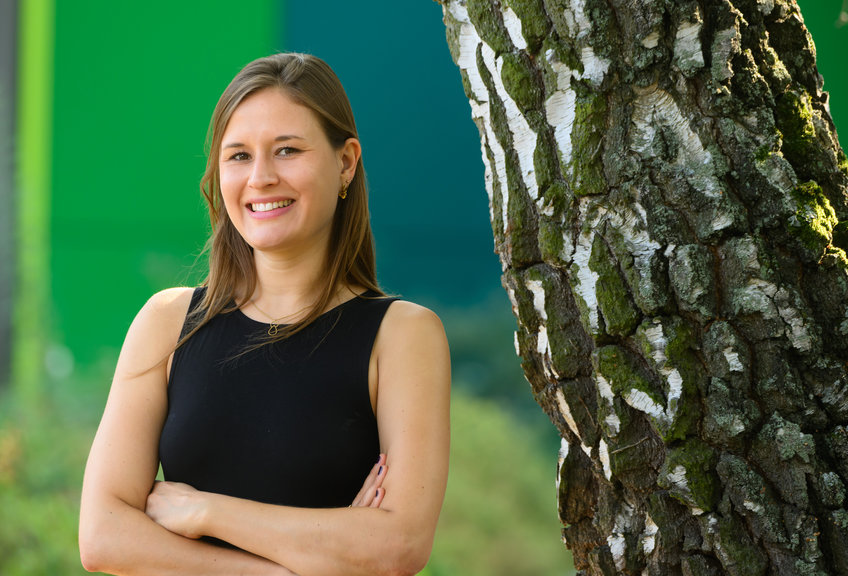
Dr. Juliane Glaser
Curriculum Vitae
Juliane Glaser studied Molecular Biology and Genetics, earning a M.Sc. from the Paris Cité University (France). She completed her Ph.D. at the Curie Institute in Paris under the supervision of Dr. Deborah Bourc’his. During her Ph.D., Juliane studied the process of genomic imprinting in mammals. Her work showed how transient transcription in early mammalian development can epigenetically program the activation of an imprinted gene involved in post-natal feeding and growth.
Following her Ph.D., Juliane secured an independent HFSP postdoctoral funding to join the lab of Pr. Stefan Mundlos at the Max Planck Institute for Molecular Genetics (MPIMG) in 2019. Her research centered on deciphering the importance of the non-coding genome in the context of developmental diseases. She studied the impact of structure genomic variations, ranging from inversions and duplication to the insertion of transposable elements, on developmental genome regulation and disease.
In 2025, Juliane Glaser will leave the MPIMG and head her own Research Group focusing on Transposable Elements and Embryogenesis.
Education
28/06/2018 PhD, Life Science
Supervisor: Dr. Deborah Bourc’his. Institute Curie, Paris.
07/2014 MSc, Genetics
Paris Cité University, Paris, France
07/2011 BSc, Biology & Biochemistry
Denis Diderot University, Paris, France
Current position
2019 – Present Postdoctoral Researcher
Max Planck Institute for Molecular Genetics, Berlin, Germany
Previous positions
2014 – 2018 Graduate student and short Postdoc
Institut Curie, Pierre et Marie University, Paris, France
2013 Research intern
New York University Medical Center- New York, NY, USA
2012 Research intern
European Molecular Biology Laboratory, Heidelberg, Germany
Selected list of publications
J. Glaser †, G. Cova, B. Faulner, C.A. Prada-Medina, V. Stanislas, M.H.Q. Phan, R. Schöpflin, V. Laupert, Y. Aktas, G. Andrey, M. Franke, C.Paliou, W. Chan, L.Wittler, T.Mielke, S. Mundlos †. Enhancer adoption by an LTR retrotransposon generates viral-like particles causing developmental limb phenotypes. †co-corresponding authors (2024) BioRxiv. doi: https://doi.org/10.1101/2024.09.13.612906
G. Cova*, J. Glaser*, R. Schopflin, C.A. Prada-Medina, S. Ali, M. Franke, R. Falcone, M. Federer, E. Ponzi, R. Ficarella, F. Novara, L. Wittler, B. Timmermann, M. Gentile, O. Zuffardi, M. Spielmann, S. Mundlos. Combinatorial effects on gene expression at the Lbx1/Fgf8 locus resolve Split-Hand/Foot Malformation type 3. * These authors equally contributed to this work (2023) Nature Communication 14,14775. doi: 10.1038/s41467-023-37057-z
S. Balachandran, C. A. Prada-Medina, M. A. Mensah, J. Glaser, N. Kakar, I. Nagel, J. Pozojevic, E. Audain, M-P. Hitz, M. Kircher, V. K.A. Sreenivasan, M. Spielmann. STIGMA: Single-cell tissue-specific gene prioritization using machine learning (2024) The American Journal of Human Genetics 111, 338–349. doi: 10.1016/j.ajhg.2023.12.011
Ringel, Q. Szabo, A. M. Chiariello, K. Chudzik, R. Schöpflin, P. Rothe, A.L. Mattei, T. Zehnder, D. Harnett, V. Laupert, S. Bianco, S. Hetzel, J. Glaser, M.H.Q. Phan, M. Schindler, D.M. Ibrahim, C. Paliou, A. Esposito, C.A. Prada-Medina, S.A. Haas, P. Giere, M. Vingron, L. Wittler, A. Meissner, M. Nicodemi, G. Cavalli, F. Bantignies, S. Mundlos, M.I.Robson. Repression and 3D-restructuring resolves regulatory conflicts in evolutionarily rearranged genome. (2022) Cell 3689-3704.e21. doi: 10.1016/j.cell.2022.09.006
J. Glaser, J. Iranzo, M. Marinucci, M. Borenztein, A. Gualtieri, C. Jouhanneau, A. Teissandier, , C. Gaston Massuet, and D. Bourc’his. The imprinted Zdbf2 gene finely tunes control of feeding and growth in neonates. (2022) Elife ;11:e65641. doi: 10.7554/eLife.65641
J. Glaser and S. Mundlos. 3D or Not 3D: Shaping the Genome during Development (2021) Cold Spring Harb Perspect Biol 27;14(5):a040188. doi: 10.1101/cshperspect.a040188
M.V.C. Greenberg*, J. Glaser*, M. Borsos, F. El Marjou, M. Walter, A. Teissandier, and D. Bourc’his. Transient transcription in the early embryo sets an epigenetic state that programs postnatal growth. * These authors equally contributed to this work (2017) Nature Genetics 49: 110–118. doi: 10.1038/ng.3718 F1000Prime recommendation - F1000Prime.com/726971069#eval793526035